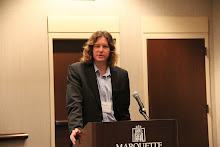My recent discussions of Meillassoux and Thought-World-Correlationism has given rise to some discussion about the thinkable, unthinkable, meaningless and so on. I think these are very interesting questions, but in general I find the conception of "thought" which philosophy has tended to work with to be a fairly deceptive theoretical distortion. In this I follow Heidegger. If we look to how we make our way through the world on a day to day basis we find something rather different than the "thought" we find discussed in many areas of philosophy.
Here is a Wittgenstein quotation on the subject which may serve to change some of the recent tone of my blog. It is from his Remarks on the Foundations of Mathematics and calls into question which it means for thought or inference to be constrained. We might take it to be a comment on what we mean by the thinkable and unthinkable:
"And thinking and inferring (like counting) is of course bounded for us, not by an arbitrary definition, but by natural limits corresponding to the body of what can be called the role of thinking and inferring in our life... And I say further that the line between what we include in 'thinking' and what we no longer include in 'thinking' is no more a hard and fast one than the line between what is still and what is no longer called 'regularity'. Nevertheless the laws of inference can be said to compel us; in the same sense, that is to say, as other laws in human society."
Tuesday, May 25, 2010
"Quotation for the Day" or "A Thought about Thought"
Labels:
Correlationism,
Meillassoux,
quotations,
Thought,
Wittgenstein
Subscribe to:
Post Comments (Atom)


I tend to get tangled up in those distortions you mention. Wittgenstein, in the Tractatus, also wrote: “an imagined world, however different it may be from the real one, must have something—a form—in common with it.” He seems to suggest that thinking/imagining is a very creative endeavor, in the way that people generally think of fiction writing, for example. We can imagine a certain scenario, and work towards making it a reality precisely because it corresponds in some formal way to the world we live in.
ReplyDeletePart of the reason I am drawn to Wittgenstein at the moments when I am is because, at least as I read him, much of his later work concerned his growing sense that the answers he provided in the Tractatus were inadequate. In particular he seems to have become concerned about what it could possibly mean for there to be a "formal" correspondence between world and thought. What, really, is a form or formal characteristic? His later work, such as the Philosophical Investigations and Remarks on the Foundations of Mathematics, seem overtly concerned with problematizing the idea of formal characteristics and abstract entities. Thus his interest in mathematics and general rules. The question becomes, in what way does the imaginable or thinkable share formal characteristics with the life we lead? What are these formal aspects and what access do we have to them? A rough and direct answer is that there are no such formal characteristics, but there is the limit of the sayable and doable. In our lived social context we can speak and act in an ex-centric manner to only a limited degree before we no longer receive any useful or interesting response from those around us. This serves to establish the limit of the thinkable. It is interesting the connection open, here, with Foucault's "History of Madness".
ReplyDelete